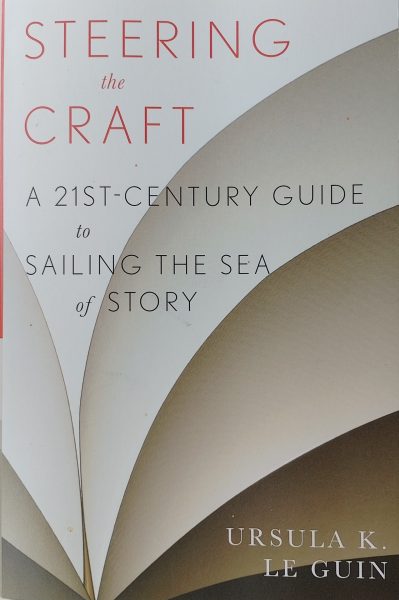Writing Skills
Courses
1st Group: The 7th meeting will be on Wednesday 20th March at 7.00 pm. See below for the 7th assignment.
2nd Group: The 3rd meeting will be on Wednesday 27th March at 7.00 pm. See below for the 3rd assignment.
The objective of this course is to help us improve our skills as writers. It focuses on enlivening our prose, and not on character, plotting or anything to do with publication.
Each month participants read one of the chapters of Steering the Craft by Ursula K. Le Guin (typically 12 pages) and write a short piece of prose that follows the suggested exercise (typically 250 words). We get together as a group to discuss the topic and read our pieces (not everyone has to read every time, but everyone should read on at least some occasions.)
Participants must be prepared to complete the reading and exercises each month and to attend the group meetings. While it may not be possible for everyone attend all the sessions, every effort needs to be made because a large part of the benefit of this course comes from hearing how our fellows reacted to the reading, tackled the exercises, and from the critiques other participants make on our own pieces.


First Assignment
- If you haven’t already done so, get a copy of the book.
- Start by reading the Appendix: ‘The Peer Group Workshop’. This explains how the workshops should run, and what is expected of you.
- Next read the introduction: this explains what this course is all about.
- Now read chapter one on ‘The Sound of Your Writing’.
- Complete the two short writing exercises (Exercise One, Parts One and Two).
- A week before the 1st meeting email your pieces to all participants.
- Read all the pieces as they come in and prepare a brief critique of each.
In the meeting:
- We will discuss the chapter and then read our pieces and our critiques of each.
- We will discuss the role of ‘gorgeousness’ in prose. When do and don’t we like to turn up the volume in our writing?
Second Assignment
- Read Chapter 2 on ‘Punctuation and Grammar’ and complete Exercise 2. Email your piece to all participants a week ahead of the second meeting.
- Have a go at punctuating each of the others’ pieces ahead of the meeting.
- Also before the meeting, have a go at punctuating the second-to-last sentence in the chapter; the one that begins ‘All that is…’ Le Guin suggests that three semicolons are sufficient to make sense of it. Can you come up with a suitable solution with those, and are there any other possible punctuation solutions?
In the meeting:
- We will each read our pieces, and see how our punctuation compares to the author’s reading.
- Each of us will name what grammar books we use (if any) when we are writing.
- We will discuss solutions to punctuating ‘All that is…’
Third Assignment
- Read Chapter 3 on ‘Sentence Length and Complex Syntax’ and complete Exercise 3 Parts 1 and 2. Email your pieces to all participants a week ahead of the second meeting.
- Prepare a critique each of the others’ pieces ahead of the meeting.
- You may wish to do the supplementary exercises on pages 33/34, but don’t send them out.
In the meeting:
- We will discuss the material in the Chapter – what do you think about the examples she quotes?
- Each of us will read our pieces and listen to the other participants’ critiques.
- What about sentence length choices made by other writers – short, mixed, or long: Proust anyone? Joyce? What about writing for younger readers or genre fiction?
- Any thoughts on paragraph length? (Proust again…)
Fourth Assignment
- Read Chapter 4 on ‘Repetition’ and complete Exercise 4 Parts 1 and 2. Email your pieces to all participants a week ahead of the second meeting.
- Prepare a critique each of the others’ pieces ahead of the meeting.
In the meeting:
- We will discuss the material in the Chapter – what rules have you heard about repetition and do you agree with them?
- Each of us will read our pieces and listen to the other participants’ critiques.
- Have you changed your mind about repetition in prose? Do you find your prose writing shading into poetry if you use too much?
Fifth Assignment
- Read Chapter 5 on ‘Adjectives and Adverbs’ and complete Exercise 5. Email your pieces to all participants a week ahead of the second meeting.
- Prepare a critique each of the others’ pieces ahead of the meeting.
In the meeting:
- We will discuss the material in the Chapter.
- Each of us will read our pieces and listen to the other participants’ critiques.
- Has this made you think more carefully or differently about your use of adjectives and adverbs? How does removing them (or adding them) change the way a piece of prose reads?
Sixth Assignment
- Read Chapter 6 on ‘Verbs: Person and Tense’ and complete Exercise 6 – both versions. Note that for Version One you may choose both the person and tense, but should stick with your choice for the whole piece. For Version Two, use the person you didn’t use in Version One and also switch tenses for the different parts of your story.
- Email your pieces to all participants a week ahead of the second meeting.
- Prepare a critique each of the others’ pieces ahead of the meeting.
In the meeting:
- We will discuss the material in the Chapter.
- Each of us will read our pieces and listen to the other participants’ critiques.
- Has this made you think more carefully or differently about your use of tense and person? How does changing them alter the way a piece of prose reads?
Sventh Assignment
- Read Chapter 7 on ‘Point of View and Voice’ and complete Exercise 7 – all five versions (part one, first and second, and parts two three and four.) Email your pieces to all participants a week ahead of the second meeting.
- If you have time, do the Optional exercise, but don’t email that one – it’s just for your benefit.
- Prepare a critique each of the others’ pieces ahead of the meeting.
In the meeting:
- We will discuss the material in the Chapter.
- Each of us will read our pieces and listen to the other participants’ critiques.
- Has this made you think more carefully or differently about your use of point of view? How does changing it alter the way a piece of prose reads?
- What did you think of the examples quoted in the chapter?
TIme and Place
The course meetings take place at William’s home in Steeple Langford, SP3 4NH.
See above for specifics of time and date of the meetings relating to your course group.
The meetings last around an hour and a half.
The course is free.
